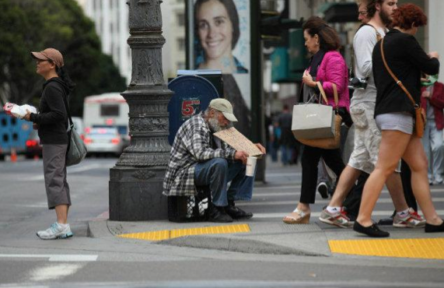CA cities, counties ask for Supreme Court’s help on homelessness

Rushing to meet last week’s deadline for filing amicus briefs, dozens of local governments and other groups in California have jointly and separately beseeched the high court to uphold laws targeting sleeping in public. Such laws are seen as a key way to crack down homelessness.
The flood of legal filings came in support of an appeal to the U.S. Supreme Court filed by the city of Boise, Idaho. The city opposes a September 2018 ruling by a three-judge panel of the 9th U.S Circuit Court of Appeals that held that just as governments “may not criminalize the state of being ‘homeless in public places,’ [the city of Boise] may not criminalize conduct that is an unavoidable consequence of being homeless — namely sitting, lying or sleeping on the streets.”
In July, Boise hired attorneys Ted Olson and Theane Evangelis of the Los Angeles-based law firm Gibson, Dunn & Crutcher for its appeal. The attorneys sought amicus briefs from affected local governments and stakeholders in the states bound by the 9th U.S. Circuit’s ruling: Alaska, Arizona, California, Hawaii, Idaho, Montana, Nevada, Oregon and Washington.
Lawyers for Boise say court overreached
Olson’s and Evangelis’ argued that the Boise ruling could create never-ending legal fighting by taking away a tool communities need to deal with homelessness, as well as create massive new fiscal obligations.
As CalWatchdog reported last week, the L.A. County Board of Supervisors backed joining an amicus brief prepared by the California State Association of Counties. Among the other government bodies that decided to back Boise:
- The city of Los Angeles. City Attorney Mike Feuer said last week that the ruling “could place the city at risk of litigation as leaders strive to fashion the humane, practical solutions this crisis urgently demands.” Mayor Eric Garcetti, an outspoken advocate of what he sees as a humane approach to homelessness, did not support Feuer’s decision.
- Riverside, Orange and Fresno Counties.
- The cities of Sacramento, Fullerton, Torrance and Newport Beach.
The decisions reflect a rift between high-profile politicians like Garcetti, Gov. Gavin Newsom and Sacramento Mayor Darrell Steinberg who call for a compassion-first approach on homelessness and politicians who are responding to frustration and anger from their constituents over homeless encampments disrupting neighborhoods. Homelessness has gotten steadily worse in most California cities over the last dozen years, fueled initially by the Great Recession and then by the high cost of housing.
But the Boise ruling also is unpopular across the West. The Idaho Statesman reported that 20 amicus briefs supported by 81 different groups from a range of states had been filed with the U.S. Supreme Court.
Plaintiffs’ lawyers doubt high court will take case
The newspaper noted that one was filed by MaryRose Courtney, whose brother is homeless and mentally ill, and the Ketchum-Downtown YMCA in Los Angeles. Unlike many of the briefs, it didn’t focus on the fiscal and quality-of-life headaches that could result from the Boise ruling. Instead, Courtney challenged the notion that tolerating sleeping in public was humane.
This approach is “leading to more aggressive policing, as police prohibited from enforcing anti-camping laws turn to arresting homeless people for more serious offenses like public urination, public defecation and public nudity,” she wrote. “Court rulings like the 9th Circuit’s in this case do far more harm than good because they lead to deregulation and generate apathy and inaction, as well as a sense of frustration that discourages further efforts to help the homeless.”
But plaintiffs’ lawyers from Idaho Legal Aid Services and the National Law Center on Homelessness & Poverty told the Statesman that they were skeptical the Supreme Court would take up the case because the ruling by the panel of 9th Circuit judges was based on earlier court rulings on homeless ordinances that had not been overturned.
Plaintiffs have four weeks to prepare a response to the amicus briefs.
If the high court decides to take up the case, a hearing is expected in the spring with a ruling by the end of the court’s term in June, the Statesman reported.
Chris Reed
Chris Reed is a regular contributor to Cal Watchdog. Reed is an editorial writer for U-T San Diego. Before joining the U-T in July 2005, he was the opinion-page columns editor and wrote the featured weekly Unspin column for The Orange County Register. Reed was on the national board of the Association of Opinion Page Editors from 2003-2005. From 2000 to 2005, Reed made more than 100 appearances as a featured news analyst on Los Angeles-area National Public Radio affiliate KPCC-FM. From 1990 to 1998, Reed was an editor, metro columnist and film critic at the Inland Valley Daily Bulletin in Ontario. Reed has a political science degree from the University of Hawaii (Hilo campus), where he edited the student newspaper, the Vulcan News, his senior year. He is on Twitter: @chrisreed99.
Related Articles
Santa Ana: No link between pay, performance
A Voice of OC story details the extraordinary pay that the city of Santa Ana lavishes on its top managers:
CalWatchdog Morning Read – August 17
California gets low “freedom” score Water restrictions practically gone for the rest of the year Some felons may soon vote
Bogus ‘science’ study claims climate increasing violence
Here’s the abstract from “Science” magazine on a new study: “A rapidly growing body of research examines whether human conflict




